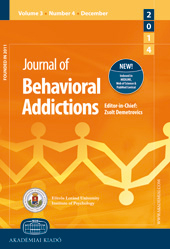Orthorexia nervosa: A behavioral complex or a psychological condition?
Orthorexia nervosa: A behavioral complex or a psychological condition?
Author(s): Jana Strahler, Andrea Hermann, Bertram Walter, Rudolf StarkSubject(s): Behaviorism
Published by: Akadémiai Kiadó
Keywords: orthorexia nervosa; eating disorder; obsessive–compulsive disorder; affective disorder; lifestyle
Summary/Abstract: Numerous studies have provided evidence for orthorexia nervosa (ON), an eating pattern characterized by an almost manic obsession for and fixation on healthy eating, to be of epidemiological relevance. However, there is scientific debate on whether it is merely a behavioral or lifestyle phenomenon as compared to a mental disorder. Aim of this cross-sectional study was to explore whether ON is of epidemiological and clinical relevance, and whether ON can be distinguished from other mental health disorders and healthy lifestyle features. Methods. An online survey including a measure of orthorexic behaviors [Duesseldorf Orthorexia Scale (DOS)], well-being and distress, eating behaviors, pathological eating, anxiety and depression, addictive behaviors, obsessive–compulsive symptoms, personality, and health behaviors was completed by 713 subjects (79.8% women, 18–75 years, median age: 25 years). Results. Twenty-seven subjects (3.8%, 21 women) showed significant orthorexic eating (DOS ≥ 30). ON cases reported lower well-being, lower satisfaction with life, and higher current stress levels than non-ON cases. The highest percentage of variation in ON was explained by pathological eating (R2 = .380), followed by eating style, Mediterranean diet, compulsive symptoms, and subjective social status. Importantly, ON provided hardly any additional predictive value for well-being when also considering pathological eating. Discussion and conclusions. Our data confirmed the epidemiological and clinical relevance of orthorexic behaviors, but the strong conceptual overlap with other mental health problems and pathological eating raise initial doubts as to whether ON is a distinct mental health disorder category. This co-occurrence, unique symptoms, and underlying processes need further exploration by comparing ON cases with patients with other mental disorders.
Journal: Journal of Behavioral Addictions
- Issue Year: 7/2018
- Issue No: 4
- Page Range: 1143-1156
- Page Count: 14
- Language: English

